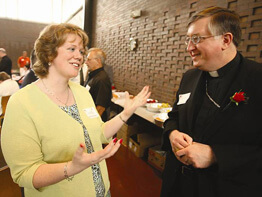More than 200 religious education directors, catechists and priests filled the meeting room at St. John the Evangelist, Columbia, May 9 for an all day Bishop’s Summit on Confirmation, sponsored by the Division of Youth and Young Adult Ministry.
“This is an opportunity to encourage and increase enthusiasm for confirmation,” said Scott Miller, coordinator of adolescent faith formation for the division of youth and young adult ministry. “We want to build up the sacrament of confirmation.”
The day began with a prayer service led by Bishop Denis J. Madden, urban vicar, before Bishop Mitchell T. Rozanski, eastern vicar, gave a lively talk on what confirmation is all about and how it fits into a Catholic’s life.
“We have so many mixed emotions about this sacrament. I’ve heard it called the Pluto of sacraments,” said Bishop Rozanski, as the crowd broke into laugher. “Is it the Mini Me of Baptism?”
Bishop Rozanski said that while studying theology he found that the sacrament of confirmation is difficult to place in Jesus’ public ministry. He referenced a passage where Jesus told his disciples if he didn’t leave, the Holy Spirit wouldn’t have an opportunity to enrich their lives.
“I do think we are on the right track to link confirmation and community service. For many of them it is an eye-opening experience,” said the bishop. “It is important to link confirmation concretely with the service of Jesus.”
He encouraged the audience to inform, inspire and invite the newly confirmed into their parish.
Sharon Bogusz, coordinator of evangelization and adult catechesis for the archdiocese, spoke about cultivating a culture of commencement and compared the confirmation process to a garden that needs work but in the end yields beautiful fruit.
She said parishes are meant to be places of apprenticeship for the confirmandi. There are three apprenticing elements, tilling, planting and nurturing. Tilling is the daily work of faith, planting is the values of the faith community and nurturing is the world’s view of the community and the way they reflect on God. The laborers in the garden who help youth prepare for Confirmation are their family, parish, Catholic school, parish religious education and youth ministry program.
“Even the rockiest land can bear great fruit,” said Ms. Bogusz. “The goal of the community is to go and make disciples.”
During the homily at noon Mass Bishop W. Francis Malooly, western vicar shared a piece of a Confirmation letter by Kristina Jackson who wrote, “This period in my life is the time where I am beginning to decide what I want to do with my life – and I know for sure that I want Christ to keep me company in everything I do.”
Mae Richardson, youth ministry coordinator at Sacred Heart, Glyndon and Paul Gallagher, director of Religious Education at St. John, Westminster, asked the crowd some important questions that some people have a hard time answering. What is the role of the parents and sponsors? How do we get them more involved in the confirmation processes?
Ms. Richardson said parents are the primary catechist – they are the ones that young people learn their faith from and they are the domestic church. She encouraged the audience to find a way to empower parents to talk to their youth about their religious and sacramental experiences and become involved in the process of confirmation.
The duo explained that a sponsor’s role is to “be a companion on the journey, someone who will walk with them.” A sponsor should be a model of lived faith, a guide and listener, dedicated to the confirmandi’s personal and spiritual growth and will serve on behalf of the church, they said.
“The process is neither a graduation nor drudgery,” said Mark Pacione, director of the division of youth and young adult ministry. “It’s a joyful sacrament and the preparation should be joyful as well.”
Mr. Miller echoed Mr. Pacione’s statement by saying confirmation is a wonderful blessing in a young person’s life.
“Catechesis is a lifelong process for the individual and a constant and concerted pastoral activity of the Christian community,” he said during his presentation on “the basics of confirmation preparation.
He said the goal of confirmation is to prepare youth, focus on active membership and invite young people to live as disciples. The major components of preparation are families, sponsors, parish community, catechesis, service, retreat experiences, prayer and worship and the interview process. He asked the group to invite young people to include confirmation covenants in their letters to the bishops.
“The hope is that people will go back to their parishes with ways to refresh their programs,” said Mr. Pacione.


